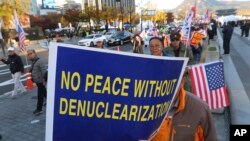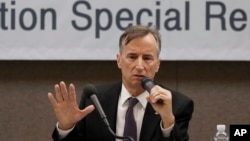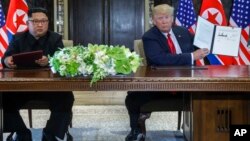Washington faces mounting pressure from China, Russia and South Korea, as well as humanitarian groups, to ease sanctions on North Korea as the Trump administration’s denuclearization talks with Pyongyang have hit a snag.
Washington’s talks with Pyongyang stalled last week when North Korea abruptly canceled a scheduled meeting with Secretary of State Mike Pompeo amid U.S. efforts to maintain sanctions while engaging in diplomatic negotiations with the country.
South Korean President Moon Jae-in is expected to bring up the issue of relaxing North Korean sanctions when he meets with Chinese President Xi Jinping during their scheduled meeting at the sidelines of Asia-Pacific Economic Cooperation (APEC) summit in Papua New Guinea on Saturday as an attempt to revive the stagnant denuclearization talks.
On Thursday, Vice President Mike Pence said President Donald Trump is expected to ask Xi to continue enforcing sanctions on North Korea when he meets with him later this month at the Group of 20 meeting in Buenos Aires.
Sanctions eased?
The U.S.-China Economic and Security Review Commission said in its annual report released this week that China appears to have eased implementing sanctions on North Korea.
Last week, U.S. Ambassador to the United Nations Nikki Haley rejected the Russian request to ease sanctions on North Korea during a closed-door U.N. Security Council meeting called by Russia.
Haley said North Korea still has “their facilities, they have still not allowed inspectors to go and inspect the nuclear facility or the ballistic missile facility. And as long as that’s happening, we need to stay the course.”
Calls for easing sanctions on North Korea also come from humanitarian groups, a move that could lead China, Russia and South Korea to pressure the United States, Ken Gause, director of the International Affairs Group, said.
In October, a group of U.S.-based nongovernmental organizations (NGOs) sent a letter to Trump requesting him to “modify [the U.S.] sanctions regulations” and ease the travel ban against North Korea “to allow timely delivery of humanitarian aid and other NGO engagement” with the country.
Also in October, the U.N. Sanctions Committee on North Korea granted the United Nations International Children’s Emergency Fund (UNICEF) a partial exemption from sanctions on North Korea, permitting the organization “to engage in humanitarian activities” and “to allow for the shipment of items to [North Korea].”
Responding to the U.N. sanctions exemption, a State Department official said in an email to VOA’s Korean Service earlier this week, “We continue to support life-saving aid needed by vulnerable [North Korean] citizens to combat transnational threats.”
Concrete steps
Experts warn that Washington should not ease sanctions imposed on North Korea until it takes concrete steps toward denuclearization.
“It would be premature to ease sanctions at this point,” said Troy Stangarone, senior director of the Korea Economic Institute. “North Korea has yet to provide a denuclearization of its nuclear program or take substantive steps to dismantle its program.”
William Newcomb, a former U.S. Treasury official who was on the U.N. Security Council’s Panel of Experts on North Korea, said North Korea needs to take several key steps toward denuclearization before any sanctions could be lifted.
“There are a number of actions [North Korea] could undertake to demonstrate a commitment to getting rid of [weapons of mass destruction] and prohibit missile capability, such as withdrawal from proliferation activities and providing detailed, verifiable information on programs and locations,” Newcomb said. “Should such steps be taken, then reconsideration of some measures would be appropriate.”
William Brown, a former U.S. intelligence official and a professor at Georgetown University who focuses on the North Korean economy, said suspending production of fissile nuclear material is the essential first step that North Korea needs to take toward complete denuclearization that would prompt sanctions relief.
“The financial and more general trade restrictions should remain until Pyongyang moves toward permanent reduction and ultimate elimination of its nuclear weapons,” Brown said.
‘Snap back’ sanctions
Robert Manning, a senior fellow at the Atlantic Council, said, “The U.S. can suspend some sanctions (to be negotiated) in exchange for agreed-upon steps of denuclearization.”
Manning continued, “This could be done by getting a new U.N. Security Council resolution that commits ‘snap back’ sanctions if North Korea fails to comply.” Snap back refers to the restoration of lifted sanctions if North Korea falls short of reaching its denuclearization agreements.
Gause, of the International Affairs Group, said he believes Washington will ease sanctions only when it thinks sanctions are ineffective.
“The U.S. will relax sanctions once the U.S. comes to terms that the sanctions are not really working on North Korea,” he said.
Jonathan Schanzer, a former Treasury Department official and currently a senior vice president at the Foundation for Defense of Democracies, said, “The key to success, to the extent that success is possible, is to sustain sanctions pressure while negotiating simultaneously.”
In an interview with NBC News on Thursday, Pence said a second summit between Trump and Kim Jong Un, tentatively scheduled for sometime early next year, will be where “a verifiable plan” to disclose the nuclear sites must be reached.
“I think it will be absolutely imperative in this next summit that we come away with a plan for identifying all of the weapons in question, identifying all the development sites, allowing for inspections of the sites and the plan for dismantling nuclear weapons,” Pence said.



















